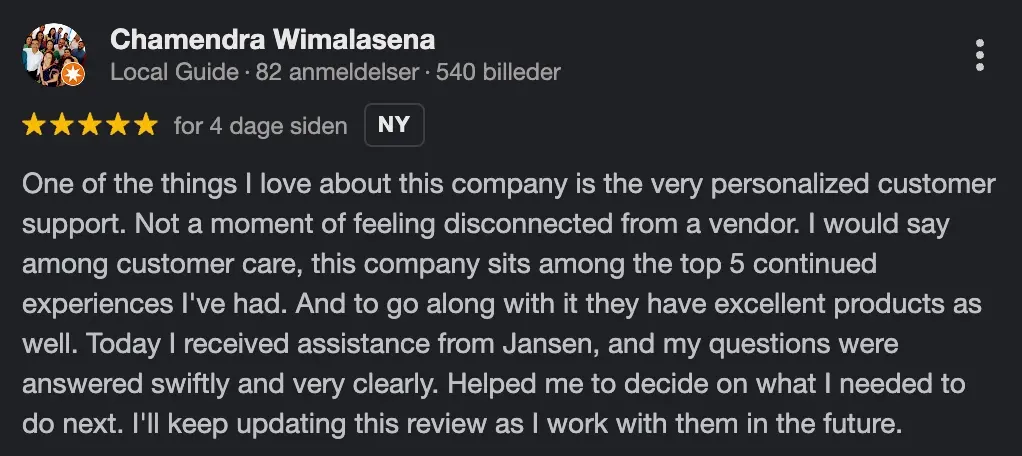When looking for a reseller hosting partner, it’s a very good idea to do your research in advance. One of the best ways to research is by checking what others have said in their reviews. However, one of the biggest mistakes that people make is to take reviews at face value.
While it’s very easy to think that every review is legitimate, this sadly is not the case. But beyond fake reviews, you also need to think about whether the reviewer has similar or identical goals to your own business. If they don’t, what you’re reading might be irrelevant.
To help you make the best possible decision, we’ll show you all the key things to consider when you read a reseller hosting review. These points are relevant whether you use TrustPilot, Google Reviews, or another platform.
1. Determine if the Review Is Genuine
Most of what we discuss in this article will require critical thinking, but before you even get to that point, it’s vital that you confirm whether a review is legitimate in the first place. If it isn’t, what the person says is irrelevant in all cases.
Learning how to respond to negative and fake reviews is important as a hosting reseller, but understanding what a fake one looks like is equally as essential. While initially challenging, it’s actually quite easy once you know what to look out for.
Below, we’ll go into more detail with three red flags to consider.
Check the Reviewer’s History
One way to determine if a review is fake is by looking at the reviewer’s history. Practically every review platform will let you do this; all you have to do is click on the person’s profile. Look at what they’ve been saying in their reviews and which companies they’ve been reviewing. If they’ve left positive reviews about one business but negative ones about its competitors, proceed with caution.
Another possible sign of a fake review is if they haven’t left anything about another company. Of course, this isn’t always a red flag; the user might be new or simply not feel the need to leave reviews in most cases. You should, in these cases, look at some of the other possible warning signs.
Reverse Lookup Their Picture
One of the best (and most underrated) ways to determine whether you’re reading a fake review is to perform a reverse lookup on their picture. In short, this is when you search for an image and see if it’s visible on Google. Your browser will show you results and pages where the photo might have been used.
To do this, you’ll first have to open Google Chrome. Right-click on the image and select Search With Google Lens. If you see results that look a bit sketchy, it’s a good idea to proceed with caution.

Check to See if the Reviewer Is Associated With the Company
Unless you’re looking at reviews for working with a company, it’s worth being careful when reading reviews for people who work for a company. You can normally recognize these from afar because they tend to feel somewhat forced, and the praise will often be generic and vague.
You can check if a reviewer is associated in several ways. Sometimes, it might appear in their bio on the website. However, you may also want to check the company website and their LinkedIn profile. Not all of these reviews are fake, but it could be a sign that the one you’re reading is.
Look for Verified Badges
One of the easiest ways to determine if a reseller hosting review is genuine is to look for verified badges or something similar. For example, Google has a “Local Guide” icon; in most cases, these reviewers are legitimate.
The platform might have other ways to show that someone is genuine. For example, if they leave a lot of reviews, the user might receive points and level bonuses. You can normally trust these reviews.

2. Ask Whether the Problems People List Are Things You’re Willing to Deal With
Regardless of how good a reseller hosting partner is, no service is perfect. Nonetheless, this does not mean that every negative review will directly affect you.
It’s very important that you thoroughly read every review for a product or service you’re planning to use. Look at what the reviewer likes in particular, but at the same time, don’t ignore the potential drawbacks. Once you’ve done this, stop and think about whether you’re willing to deal with those problems.
If the issues that others say aren’t a deal-breaker for you, it’s worth researching further to see if you can strike a good partnership. But if they are, you should look elsewhere. Understanding this is an essential part of picking the right service and being a successful hosting reseller.
3. Assess the User’s Needs Against Yours
Besides thinking about the problems you’re willing to deal with, another useful way to look at reseller hosting reviews is to determine whether you have the same needs as a user. This will make a huge difference in people’s experience of a product or service, and it should therefore not cloud your judgment positively or negatively.
Do some more research into the user. Look at their business objectives or personal requirements, and shape them up against yours. Determine if what they say will end up being a hindrance in reaching your goals, and if it will, it’s worth looking elsewhere.
Besides assessing your needs, it’s also a good idea to look at more advanced reviewers. If their business is something you aspire to be, and you think that the positives they discuss will also benefit you, it’s very much worth researching that reseller hosting partner in more depth.
4. Consider Possible Incentives That the Reviewer Might Have
In addition to looking out for people who might be employees, it’s also a good idea to look at other incentives the reviewer could have. For example, while most affiliates are genuine, you should also be skeptical of a review that gives all positives and no negatives.
When you promote affiliate links, it’s very important that you’re transparent about both the pros and cons. Yes, you’ll earn money when someone purchases via your link – but you also want to upkeep your credibility. You should adopt the same logic when you’re reading other people’s reviews, whether those are blog posts or review sites.
Even if the reviewer is technically incentivized, you can normally tell if they’re being genuine. Listen to balanced reviews, but be very careful when reading those that give only one side of the story.
5. Determine How Rational the Review Is
When we use products and services, our emotions can play a significant role in what we think about something at any given time. You’ll probably already know this; you’ll probably love your phone when it’s working but hate it if it isn’t. With this in mind, you should also think about whether the reviews that you read are based on emotions or balanced thinking.
If a customer has had a negative experience, they may write a review to vent. Unfortunately, while some people go back and change these after the problem has been solved, this is not the case for everyone.
Look at the language used in the review. A rational person may still give a negative review, but they’ll likely use calmer language to explain their frustration. This is very different from a review using caps lock, swear words, or anything along those lines.
6. Look at How the Hosting Provider Responds
Responding to reviews is an art form, as any customer support team member will tell you. Even if you choose the best reseller hosting partner, it’s possible that some issues could arise. With this in mind, reading reviews can serve as a critical lens through which you see resolution.
If a customer support team member replies in a polite and level-headed manner, this is a green flag. You also want to check to see to which lengths they sought to solve the problem, such as asking the person for more information so they can investigate further.
Another green flag to look out for is if the person writing the review explains in clear detail what they did to solve the issue. It’s also ideal if they can paint the full picture, as reviews are sometimes one-sided.
7. Figure Out Whether an Old Review Is Still Relevant
If the reseller hosting partner is established, you’ll probably see thousands of reviews at an absolute minimum. These could span back years or decades, and as a result, it can be tricky to know if what others stay is still relevant for you.
If you see an old review that takes your interest, compare it against newer ones. Generally speaking, reviews are more relevant if the person left them within the past three years or so. Early reviews could potentially be critical because the business had to learn certain skills, and it’s therefore a good idea to see if they’ve solved these issues.
Summary
Before choosing a reseller hosting partner, it’s very important to do your research. Reading reviews is one part of this, but it’s also important to remember that not all reviews are created equally. Look at each one from a rational perspective and think about whether the reviews are genuine in the first place. Beyond that, you should also assess the reviewer’s needs and see how they match up against your own.
Frequently Asked Questions
How secure is reseller hosting?
Reseller hosting can be secure if it includes SSL certificates, data encryption, and strong security protocols.
However, the level of security also depends on the provider’s infrastructure and the reseller’s attention to client data management.
Which reseller hosting is the best?
Usually, the best reseller hosting is powered by a VPS plan. The reason for this is because as you start to scale up your business, you can easily move from one to another.
Can you make money with reseller hosting?
You definitely can. There are countless success stories from entrepreneurs that have managed to take on hundreds, even thousands of clients, just be aware of the work you’ll need to put in.
Read our article to learn more about web hosting business income.
Can reseller hosting increase my domain sales?
Yes, reseller hosting can enhance domain sales by allowing you to manage multiple domains efficiently, bundle hosting with domain sales, and provide a professional service to your clients.

Danny is a seasoned freelance copywriter with 10+ years of managing his own websites in WordPress and other content management systems. He's an expert in eCommerce and sells his own photography prints, in addition to knowing about hosting domains having used several providers. Danny's strong writing expertise is evident in his bylines across several major tech publications, including Lifewire, MUO, and Make Tech Easier.
View all posts by Danny Maiorca




















